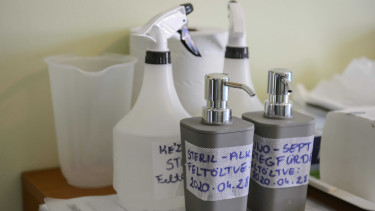Tridemic in Hungary: more viruses causing illness

Based on reports from doctors participating in the surveillance service, 239,500 people visited physicians between 5 and 11 December (week 49) with symptoms of acute respiratory infections, of whom 20,200 were diagnosed with a flu-like illness, the National Centre for Public Health (NKK) said in a weekly report on Thursday.
Of the patients who went to the doctor with a flu-like symptoms
- 32.3% were under 14 years old,
- 31.9% were aged 15-34,
- 24.6% were aged 35-59 and
- 12.2% were aged 60 years and over.
Between the 40th and the 49th weeks of the year, a total of 653 test specimens were processed at the NNK laboratory, of which 12 cases (1.8%) were confirmed to be influenza viruses, 91 cases (14%) were confirmed to be coronavirus infections, 19% were caused by respiratory syncytial virus (RSV), three (0.5%) by adenovirus, five (0.8%) by Human Parainfluenza Viruses (HPIVs), two (0.3%) by human metapneumovirus, and 12 (1.8%) by rhinoviruses which cause the common cold. There's no indication as to what the other 509 samples (78%) have shown.
The recent data confirm the view that several respiratory diseases are spreading simultaneously in Hungary. The new term "tridemic" has been coined to describe an epidemic caused by three viruses at the same time. This phenomenon can be observed in several countries in Europe, including the UK and Ireland, France, Denmark and Germany. It is not a new type of virus, certainly not a recombination of viruses, merely a form of infection. There is no possibility of recombination either, because their genetic materials (genomes) are so different.
Take care of your child(ren) but use your brains!
The Hungarian Association of General Paediatricians recommends parents to protect their children as much as possible from the various viruses. "We are expecting a simultaneous peak in flu, a peak in RSV, and we don't yet know whether a new variant of Covid is coming. So we can expect three viruses to cause a lot of illness in January, relatively at the same time. I strongly recommend that all parents protect their children against whatever they already can," warns Katalin Havasi, the president of the association.
Unlike Hungarian authorities, the US Centre for Disease Control and Prevention (CDC) is recommending masks again to mitigate the spread during holiday socialising.
“Caregivers during this ‘tridemic’ are concerned about their children’s symptoms and want to provide comfort measures at home,” the University of Southern California (USC) cited Irving Steinberg, an associate professor of clinical pharmacy and paediatrics at the USC Alfred E. Mann School of Pharmacy and Pharmaceutical Sciences.
It’s important to note that cough and cold products are discouraged by the American Academy of Paediatrics for use in young children.
"In addition, antibiotics such as amoxicillin, do not treat RSV, influenza or COVID-19. The remaining supply should be restricted to children with defined bacterial infections.
“The use of acetaminophen and ibuprofen is best guided by clinical providers. With a shortage of child-specific dosage forms, caregivers may risk inexact and potentially toxic dosing if they try using adult dosage forms," he said.
Steinberg also pointed out that "risks of acute kidney injury increase with repeated high doses of ibuprofen especially if the child is dehydrated.
The over-the-counter availability of these medicines makes it more important for pharmacists and paediatricians to be aware of these concerns and communicate effectively with patients and caregivers.
Masking can help reduce the spread of a variety of respiratory viruses, with N95 or KN95 respirators providing the highest degree of protection.
Respiratory illnesses like flu, COVID-19 and RSV can be prevented with good respiratory hygiene, including regular hand washing, avoiding close contact with individuals experiencing cold or flu-like symptoms, covering coughs and sneezes with a tissue or shirt sleeve, and disinfecting high-touch surfaces. Getting a seasonal flu vaccine and keeping up to date on COVID-19 vaccinations and boosters would not hurt, either.
Cover photo: Getty Images





